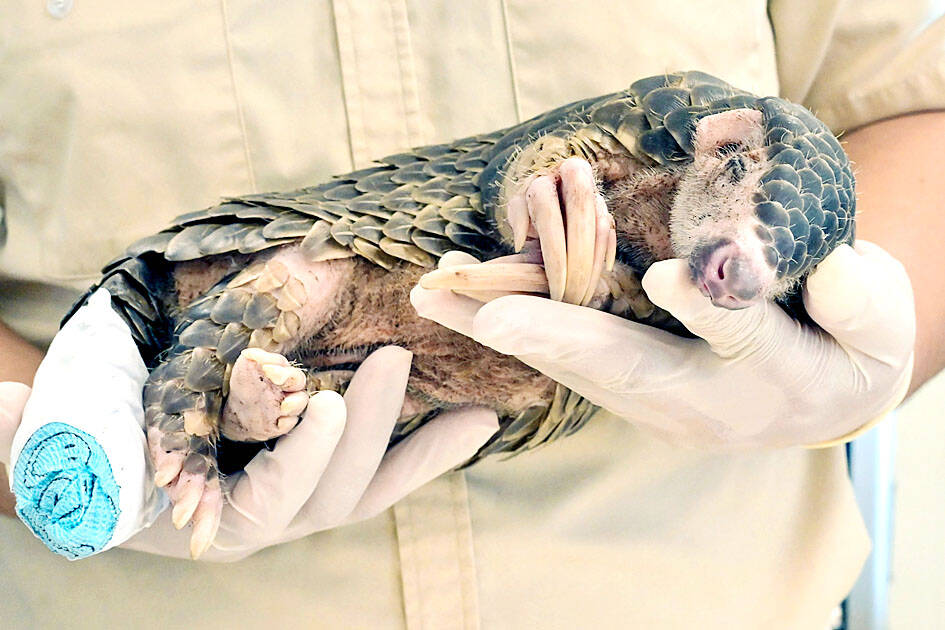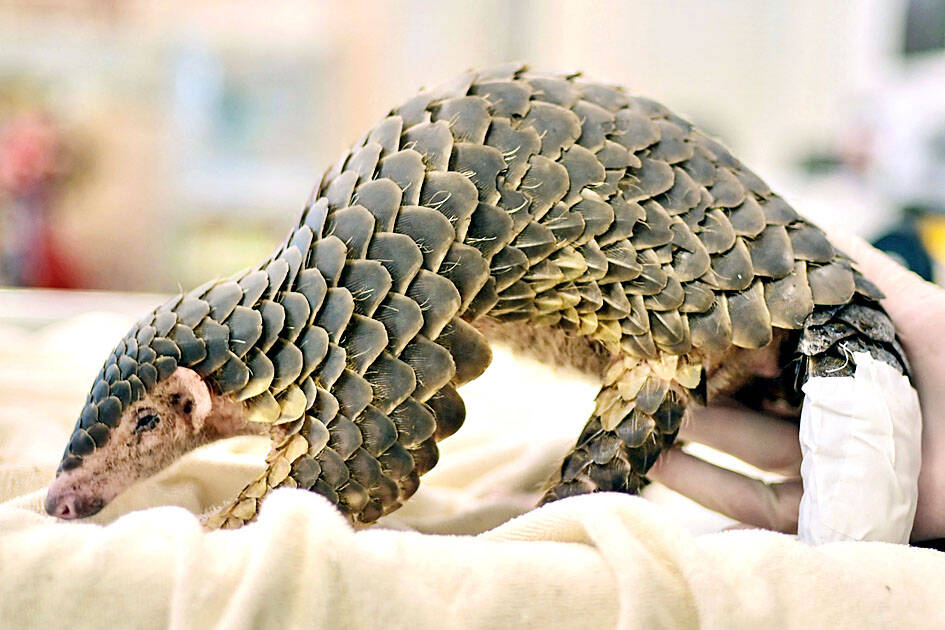In most of its habitats, the heavily trafficked pangolin’s biggest threat comes from humans, but in Taiwan, the scaly mammals brave a different danger: a surging feral dog population.
Veterinarian Tseng Shao-tung, 28, has seen firsthand what a dog can do to the gentle creatures during his shifts at a hospital in Hsinchu.
Last month, he worked to save a male juvenile pangolin who had been lying in the wild for days with half of its tail chewed off.

Photo: Sam Yeh, AFP
“It has a big open wound on its tail and its body tissue has decayed,” Tseng said, as he carefully turned the sedated pangolin to disinfect the gaping injury.
It was the fifth pangolin he and his fellow veterinarians had saved this year, all from suspected dog attacks.
Chief veterinarian Chen Yi-ru said she had noticed a steady increase of pangolins with trauma injuries in the past five years — most of them with severed tails.

Photo: Sam Yeh, AFP
Pangolins are covered in hard, overlapping body scales and curl up into a ball when attacked. The tail is the animal’s most vulnerable part.
“That’s why when attacked, the tail is usually the first to be bitten,” Chen said.
Wildlife researchers and officials said dog attacks, which account for more than half of all injuries since 2018, have become “the main threat to pangolins in Taiwan” in a report released last year.
Pangolins are described by conservationists as the world’s most trafficked mammal, with traditional Chinese medicine being the main driver.
Although their scales are made of keratin — the substance that makes up our fingernails and hair — there is huge demand for them among Chinese consumers because of the unproven belief that they help lactation in breastfeeding mothers.
That demand has devastated pangolin populations across Asia and Africa despite a global ban and funded a lucrative international black market trade.
All eight species of pangolins on both continents are listed as endangered or critically endangered.
Taiwan has been a comparative conservation success story, transforming itself from a place where pangolins went from near-extinct to protected and thriving.
Chan Fang-tse, veterinarian and researcher at the Endemic Species Research Institute, said Pangolins were heavily hunted from the 1950s to 1970s.
“Sixty thousand pangolins in Taiwan were killed for their scales and hides during that period,” he said.
A 1989 wildlife protection law ended the industry, while rising conservation awareness led Taiwanese to start embracing their scaly neighbors as something to be cherished, rather than a commodity.
The population of the Formosan pangolin, a subspecies of the Chinese pangolin, has since bounced back with researchers estimating that there are between 10,000 to 15,000 in the wild.
However, the nation’s growing feral dog population — itself a consequence of a 2017 government policy not to cull stray animals — is hitting pangolins hard, Chan said.
“Pangolins are most affected because they have a big overlap of roaming area and pangolins don’t move as fast as other animals,” Chan said.
Pangolins are also vulnerable because of how few offspring they have.
The solitary Formosan pangolins mate once a year and only produce one offspring after 150 days of pregnancy. Captivity breeding programs have had little success.
“It may be more difficult to breed pangolins than pandas,” Chan said.
The rise in injured pangolins has created another challenge for veterinarians: finding enough ants and termites to feed the picky eaters who often reject substitute mixtures of larvae.
Piling into a truck with three other vets, Tseng headed to a tree to retrieve an ant nest he had recently spotted.
“We have to be constantly on the lookout, and go search for ants nests every couple of days now because we have more pangolins to feed,” Tseng said.
A pangolin can eat an ant nest the size of a football each day. The government has also called for residents to report nest locations to help feed the pangolins until they can be released back into the wild.
The injured pangolin in Tseng’s care would likely have to be sent to a zoo or government facility for adoption after it recovers.
“It will have difficulty climbing up trees and won’t be able to roll itself into a ball shape,” Tseng said. “It has lost the ability to protect itself in the wild.”

Three Taiwanese airlines have prohibited passengers from packing Bluetooth earbuds and their charger cases in checked luggage. EVA Air and Uni Air said that Bluetooth earbuds and charger cases are categorized as portable electronic devices, which should be switched off if they are placed in checked luggage based on international aviation safety regulations. They must not be in standby or sleep mode. However, as charging would continue when earbuds are placed in the charger cases, which would contravene international aviation regulations, their cases must be carried as hand luggage, they said. Tigerair Taiwan said that earbud charger cases are equipped

Foreign travelers entering Taiwan on a short layover via Taiwan Taoyuan International Airport are receiving NT$600 gift vouchers from yesterday, the Tourism Administration said, adding that it hopes the incentive would boost tourism consumption at the airport. The program, which allows travelers holding non-Taiwan passports who enter the country during a layover of up to 24 hours to claim a voucher, aims to promote attractions at the airport, the agency said in a statement on Friday. To participate, travelers must sign up on the campaign Web site, the agency said. They can then present their passport and boarding pass for their connecting international

Temperatures in northern Taiwan are forecast to reach as high as 30°C today, as an ongoing northeasterly seasonal wind system weakens, the Central Weather Administration (CWA) said. CWA forecaster Tseng Chao-cheng (曾昭誠) said yesterday that with the seasonal wind system weakening, warmer easterly winds would boost the temperature today. Daytime temperatures in northern Taiwan and Yilan County are expected to range from 28°C to 30°C today, up about 3°C from yesterday, Tseng said. According to the CWA, temperature highs in central and southern Taiwan could stay stable. However, the weather is expected to turn cooler starting tonight as the northeasterly wind system strengthens again

Taiwan sweltered through its hottest October on record, the Central Weather Administration (CWA) said yesterday, the latest in a string of global temperature records. The main island endured its highest average temperature since 1950, CWA forecaster Liu Pei-teng said. Temperatures the world over have soared in recent years as human-induced climate change contributes to ever more erratic weather patterns. Taiwan’s average temperature was 27.381°C as of Thursday, Liu said. Liu said the average could slip 0.1°C by the end of yesterday, but it would still be higher than the previous record of 27.009°C in 2016. "The temperature only started lowering around Oct. 18 or 19